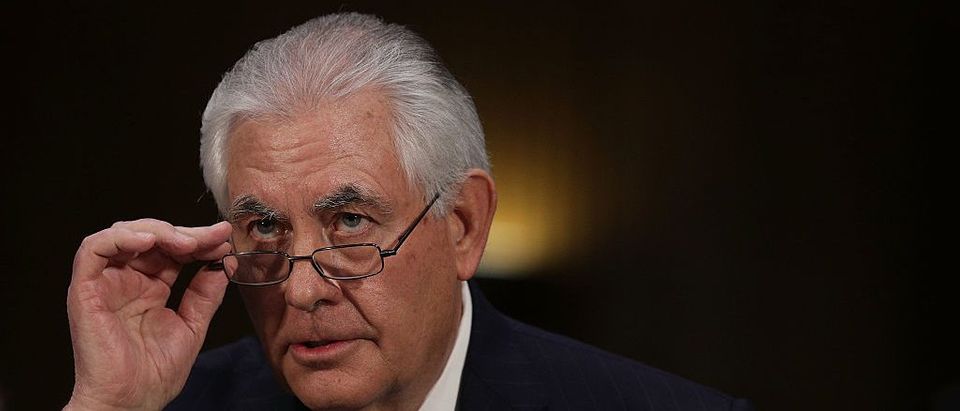Former Exxon Mobil CEO Rex Tillerson is the quintessential capitalist and American oil executive. Like his new potential boss, the President-elect, he has a unique expertise that comes with so many years in the private sector. Simply put, Tillerson serves as a calculated choice to lead foreign affairs for the United States based on a perspective that isn’t skewed by the day to day minutia of bureaucracy.
However, as the confirmation processes continue to go on in the Senate Foreign Affairs Committee, the opposition to Tillerson as the country’s lead diplomat is noteworthy.
In an effort to be straightforward, Tillerson is an exemplary choice for Secretary of State, given the track records of his predecessors in previous administrations. With that, he also serves as the only subject matter expert on a “Russia First” foreign policy model. Despite opposition, the fact that he views Russia’s international gains and recent election meddling as an imminent concern is subject to praise. In fact, Tillerson maintained close relationships with Russian oil leaders and President Vladimir Putin himself, giving him a hand up in any future dealings with the Eurasian adversary, as Secretary of State or not.
People have coined his association with Russia, due to his Exxon dealings in the region years prior, as a troubling matter. Regardless of opposition on this front, as aforementioned, Tillerson has called out the Kremlin it’s periphery as a repressive government. The only puzzling and disconcerting moment, thus far, in Tillerson’s confirmation process is his “fuzzy” response to Senator Lindsey Graham (R-SC) on issues associated with the alleged Russian hacking activities that influenced the 2016 General Election in way of Trump, as aired out in a January 11th hearing.
Senator Graham told CNN that, “[Tillerson] needs to clear that up. If he doesn’t clear that up, it would be a problem, and I think he can clear it up and he needs to clear it up,” while speaking on his response to his questions on the hackings.
The most notable of the skeptics among the GOP-led panel was Senator Marco Rubio of Florida. Rubio has made headlines for remaining relatively quiet on Tillerson’s nomination while sending vibes of opposition. The former presidential hopeful mentioned in December that he will keep an open mind when it came to vetting Tillerson; but, with the lack of a confirmatory vote tendency, one way or the other, has remained abstract to his colleagues and pundits in the news media (I am lost with Rubio).
Internal GOP politics aside, Democrats on Senate Foreign Affairs have already railed Tillerson on several areas and are unlikely to vote to confirm his nomination. Due in part to this was Tillerson’s association with Exxon Mobil and the reputation the company has developed among climate alarmists. However, Tillerson’s response to any major climate accusations simply was vested on the fact that is already well known: man-made climate change isn’t a national security risk nor as bad it has been made out to be since Al Gore’s meanderings.
Thus, typical ideological divide leaves the vote down party lines if select GOP members of the Committee stand by him.
The one major highlight that speaks volumes in all of this was the nominee’s response to (my spirit guide) Kentucky Senator Rand Paul’s question on whether or not he supported the Iraq War interventions from the George W. Bush presidency.
“President-elect has said that the Iraq war was a big, fat mistake,” Senator Paul hawked. “He said this many, many, many times. I was wondering if you agree with the statement, and if you do agree with the statement, how it will inform your judgment as to the future of the Middle East and the conflicts we are engaging or possibly engaged in in the Middle East.”
Tillerson wasted no words and gave a response that Senator Paul quite possibly viewed as a vote-deciding moment.
“Senator, I alluded to the Iraq war in my opening comments when I indicated that actions over the past decades, while well intended, had unintended consequences that in the end did not achieve the stability that we sought or the national security,” Tillerson promptly responded. “I think in that [in] regard [to] the decision to go into Iraq, change leadership in Iraq, upon reflection perhaps did not achieve those objectives. We do not have a more stable region in the world, and our national security has not been enhanced. We’re still certainly under threat today.”
One final remark that also needs to be pointed out is the fact that Tillerson is a threat to adversarial governments in the international community. He’s an oil tycoon that has personal interests and investment in over 15 different countries, according to Forbes. Professionally, he serves as hard lining powerhouse to the American foreign policy regime and will deliver results like closer ties abroad and peace stabilization that is not reminiscent of the Marshall Plan or nation-building.
He checkered; however, Tillerson, in an undiluted as possible opinion, could do actual good in the State Department and deliver on long-awaited accountability in his position. Time only can tell, though, so we must lay and wait to see.


